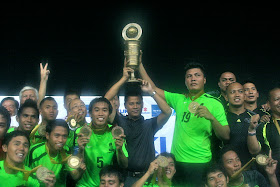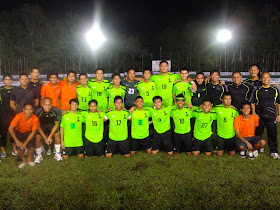How Bacolod became U-23 National Champions
When the various football associations around the country get ready to compete in next year’s PFF Suzuki Under-23 National Cup, they might want to look at the Bacolod team’s blueprint for success. Story and photos by Rick Olivares
They arrived in shades, unsmiling at first then grinning with every recognized person in sight. They were very business-like. There was a sense of purpose to their stride. Were they not uniform in their tracksuits, they’d be mistaken for a battery of lawyers.
When they did smile, try if you can, to picture a shark smiling as it hurtles towards unsuspecting prey. That was how the coaching staff of the Negros Football Association appeared when they entered the Filomeno Cimafranca Field in Silliman University on the second day of the Visayas Regionals of the ongoing PFF Suzuki Under-23 National Cup.
Rome certainly wasn’t built in a day and so are these champions.
It was the 9th of April when Norman Fegidero Jr. of West Negros University, Ramon Janeo of the University of St. La Salle, and Carlo Torbela of the University of Negros Occidental-Recoletos received word that they were taking part in the PFF Suzuki Under-23 National Cup. The problem was the tournament was already underway.
With five days before the Visayas Regionals of which they were automatically seeded into, the three college coaches together with Ali Go, coach of Dynamic Builders FC, asked, “Is that enough time to prepare?”
In years past, that answer would have been a “no.” But now, the answer was a resounding “yes.”
When it comes to collegiate football in Negros Occidental, the three universities all enjoy a fierce and acrimonious rivalry. When a team representing the province was needed for a tournament, if the coach was from La Salle, the other two schools refused to lend their best players. And it was the same for the others.
Enter Ricky and Leo Rey Yanson. The brothers once played football for La Salle Bacolod during their high school years. Although they had hung up their boots, their love for the sport never waned. In spite of their many business ventures, they had previously managed the Bacolod Open Champion Team in 2006 and the runner-up in 2007. They also had two football fields constructed – the Villa Valderrama Field and the North Field in Talisay – with two more under way (one beside Robinson’s Place and the other at Barangay Bubog).
The brothers brokered a deal for a unified Negros team under one coach. Of the four head coaches, it was Fegidero who held the highest coaching license. And the others deferred to the West Negros coach who also had a sterling record as a player and former national coach. “It is no problem on our part,” recounted Janeo. “Coach Nonoy has the credentials.”
Fegidero Jr. once played striker for WNU and later UNO-R after a brief stint in Manila playing for Ateneo-Swift and teaching in the Ateneo Football Center (he was recruited by the late Chris Monfort) in between. He once formed a strike partnership with former Rudy del Rosario who is now coach of the Philippine Homeless World Cup Team. The two with others like Adolfo Alicante and Elmer Bedia led the Philippines to a semifinals appearance in the football competition of the1991 Southeast Asian Games football held in Manila. Fegidero also coached the Azkals in the 2008 AFC Challenge Cup but immediately stepped down citing too much interference from PFF Management and others not involved with the team.
Since that time, he has gone back to West Negros where he has built up a solid and winning program with the Mustangs. Fegidero’s love for the game brooked no compromise. He insisted on team discipline and an adherence to finishing one’s studies. He wasn’t averse to tossing players out of the lineup. Or even from their captaincy as evidenced when he installed Emelio “Chieffy” Caligdong as team captain for the national squad in 2008 when he thought that Aly Borromeo wasn’t up to the task.
As for the players, Go added, “It wasn’t that hard because the players had represented the Western Visayas at one time or another. They just had to learn the system.”
An attacking 3-4-3 system was installed. “We are not sacrificing our defense,” said Fegidero. “We just want to score a lot of goals.”
When the team was at home, they were quartered in a building formerly owned by the Yansons where they would eat, sleep, and bond together. "No one could go out without securing permission," said Janeo. "We wanted them focused on the games and not anything else."
During the regionals, semifinals, and finals, they stayed in a hotel. Coaches were given specific duties that changed every now and then. The daily regimen from training to meals to rest was mapped out with Spartan efficiency.
During the regionals, semifinals, and finals, they stayed in a hotel. Coaches were given specific duties that changed every now and then. The daily regimen from training to meals to rest was mapped out with Spartan efficiency.
John Robert Mendoza, Jose Emmanuel Diel, Jimmy Malaloan, Anton Tongson, J Baguioro, Ralph Layumas, Abelardo Solinas, and Aldrin Dolino were from La Salle while Lemuel Unabia, Janrick Soriano, Jake Morallo, Jovin Bedic, and Camelo Tacusalme were from West Negros. The contingent from UNO included Gino Palomo, Willy Mangubat, Jurex Replentes, and Michael Pacite.
“Mabilis kami nag-bond,” described Bedic of how quickly the team came together.
“Isa lang naman ang goal namin,” added Unabia, the 6’1” central back. “Kunin namin ang championship.”
While most players were very familiar with one another, the wild card was Beloya.
During practice in Panaad Stadium one afternoon, the coaching staff saw him playing with some of his friends and they were immediately impressed with his skills. They asked him to tryout for the team and the coaches became utterly convinced that he would be a worthy addition to the squad.
However on the second day of practice, Beloya did not show up.
“I couldn’t walk,” recounted the Fil-Am out of Switzerland who had gone back to his mother’s hometown of Bacolod just a few weeks before that fateful meeting in Panaad. “My muscles hurt all over because I was out of shape.”
The Olongapo-born Beloya grew up in the United States and later in Switzerland where he once played for FC Zurich. Undoubtedly, he was talented. “But we had to add some muscle to him,” said Janeo. “Meron siyang explosiveness. Kung na-train siya ng mabuti hindi natin alam kung ano pa ang kaya niyang gawin.”
Because of his unfamiliarity with his teammates there were some early misunderstandings. “Alam mo na -- Fil-Am kasi,” added Janeo. “Pero nung nakausap namin, he understood his role and also his teammates.”
Beloya became the breakout star of the tournament. Off the bench in Bacolod’s first two matches, he was soon inserted in the starting lineup where he flourished even more. He showed great range, exceptional quickness, and an ability to finish in and around the goal. By the tournament’s end, he was named Best Striker as he amassed an astonishing 15 goals in nine matches and was considered as an MVP candidate (it ultimately went to Dolino).
Fegidero’s team romped through the competition and only found themselves shut out of the tally sheet when they played Masbate to a scoreless draw in the group stages. They topped the Visayas Regionals and the Group Stages and beat Davao in the semis before setting a date with long-time nemesis Iloilo in the home-and-away finals. "We didn't expect to play this well," said Go. "I think it's just one of those things were everything just clicks together."
They previously clashed in the Visayas regionals – a bloody 1-nil battle won by Bacolod that at times resembled a gang war as tackles, elbows, and punches were intermittently thrown. "It was a typical Bacolod-Iloilo game," said Fegidero at that time.
As the two teams braced for a bruising finals battle, the acrimony spilled off the pitch.
Following a controversial 3-1 loss at the Central Philippine University football field in Jaro, Iloilo where the fulltime score of 1-1 was continued in extra periods, the home team filed a protest against the tournament officials who they accused of continuing the match. Bacolod countered by filing a protest against players who were added to the lineup when they had not seen any action throughout the tournament.
PFF officials initially reverted the outcome to 1-1 but as Bacolod threatened to walk out of the competition, Iloilo withdrew their protest and the game was played.
Team management and the coaching staff of Bacolod did their best to shield the players from the brewing controversy lest it affect their morale. Fegidero already had to contend with their power shortage in the second half of play and they didn't need any more distractions.
Bacolod had scored most of their goals in the first 45 minutes. Come the reset, they had displayed a frightening penchant for losing focus while their opponents began to play much better. In the group stages, they nearly drew with NCR while Masbate owned the second half. Against Dipolog, the Mindanao squad took it to them in the match’s final 30 minutes. Fortunately for them, Dipolog was without four of their best players.
Against Iloilo, Bacolod faded in the second half of their rivals’ home match. “We will address that,” promised Fegidero of the late meltdowns.
Hardly had the fans at Panaad Stadium warmed their seats when the game was over in the opening minutes. Following a brilliant Beloya strike from 30 yards out, Iloilo crumbled. They ceded four goals after 45 minutes. And by fulltime, it was a shocking 9-0. And the title, the first ever PFF Suzuki Under-23 National Cup, the first national football competition in years, was Bacolod’s.
During the victory celebration at Bar 21 along Lacson Street that continued until the wee hours of the morning, Fegidero and his coaching staff – sans their shades – sat, ate, and drank some beer. They smiled. Not the business-like manner in which they displayed at the start of the tournament. This one was of extreme satisfaction.
The victorious Negros team minutes before they received their U23 trophy at Panaad Stadium. And below, the coaching staff at Cimafranca Field in Dumaguete. I snapped this pic after they had beaten Iloilo 1-0 and it was also the birthday of their keeper John Robert Mendoza.
The Bacolod coaching staff: (not in order) Norman Fegidero Jr., Ali Go, Ramon Janeo, Carlo Torbela, Ronnie Tornila, Simon Huleza, Dave Javellana, Michael Casas, and Lyca Jochico.



Thanks Rick! :) - Lyca
ReplyDeleteYou're welcome. I re-wrote some parts. It reads better now.
ReplyDeleteuh-ohh..typo lg po sa name nyo..sorry Sir Ric Olivares..paki change na lg po :)
ReplyDeletealam nyu maganda ung story.. at ung team wla na talagang mka ka talo sa negros team parang great wall of china... the best ung coaching staff at specially ung management... thank you sa lhat ng nag support sa negros ceres team..
ReplyDeleteProud din ako sa mga bata ko, wow!!! sabi ko nga sa Iloilo na team na yan na matatalo din sila pag matured na ang negros kasi always lamang sila sa edad pag nasa age category, lalo't na sa regional meet ang laban dahil over age ang mga bata nila. 3 yrs namin silang ka rival regional meet, POF and Pintaflores Cup...CONGRATZ NEGROS - CERES TEAM and THANKS TO YANSON BROTHERS (RJR & LRY) I'm always thankful to this person since I step in La Salle...NO REGRET..Sila ang big factor kaya ganyan ang team. Once again (THANKS to them and I Prayed to you both and to your families always)
ReplyDelete